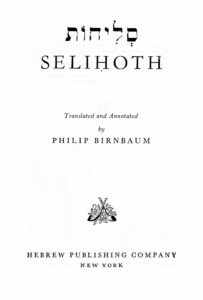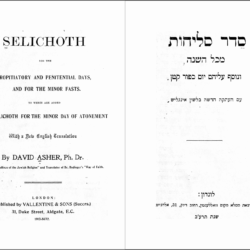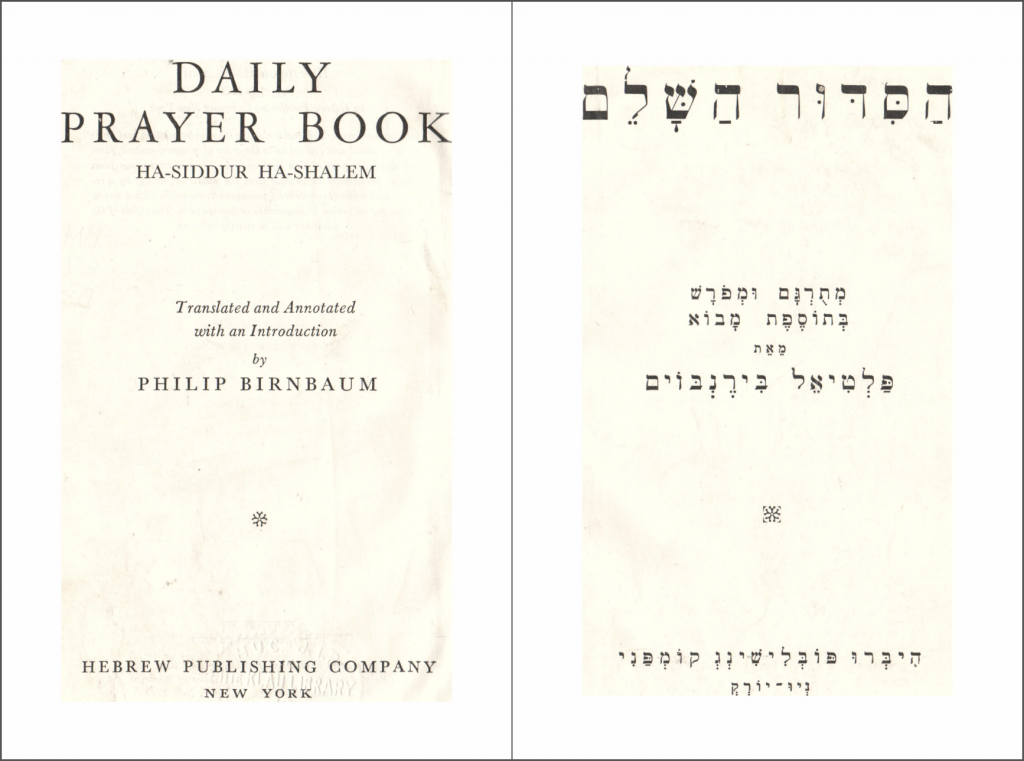Seliḥot for the First Day, translated and annotated by Philip Birnbaum (Hebrew Publishing Co., 1952), is a Seliḥot service for the first day of Seliḥot in the week prior to Rosh ha-Shanah.

This work is in the Public Domain due to the lack of a copyright renewal by the copyright holder listed in the copyright notice (a condition required for works published in the United States between January 1st 1924 and January 1st 1964).
This work was scanned by Aharon Varady for the Open Siddur Project from a volume held in the collection of the HUC Klau Library, Cincinnati, Ohio. (Thank you!) This work is cross-posted to the Internet Archive, as a repository for our transcription efforts.
Scanning this work is the first step in a more comprehensive project of transcribing each prayer and associating it with its translation. You are invited to participate in this project!
PREFACE
The penitential prayers known by the name of Seliḥoth are essentially based upon biblical poetry and are a continuation of the Psalms. In part, they belong to the age of the Talmud. They are chiefly concerned with the suffering of Israel in the various lands of the dispersion. For about fifteen centuries the liturgical poets such as Rabbi Yehudah Halevi, Ibn Gabirol and Ibn Ezra, continued to enrich the seliḥah literature, the earliest examples of which go back to the first century. Tormented by merciless persecution in the course of many centuries, the authors of these prayer-poems described the misery of their people with the blood of their hearts.
The seliḥoth reveal the saintly character of past generations, who in profound humility sought the reason of their misfortune in themselves rather than in a divine injustice. The seliḥah (“forgiveness”) is a prayer in the strict sense of the term, for it gives utterance to the feelings of the worshiper who repents and pleads for mercy.
In the course of time it became customary to begin the recital of seliḥoth Saturday midnight, four days before Rosh Hashanah. If, however, the first day of Rosh Hashanah occurs on a Monday or Tuesday, so that there are less than four days left in which to recite the penitential prayers, it is customary to begin a week earlier. The idea of a midnight service is based on Psalm 119:62 (“At midnight I rise to praise thee.”)
Without the help of a translation the noble thoughts of the payyetanim are barred to many a worshiper; even when translated they need explanatory comment. This annotated Hebrew-English edition of the Seliḥoth for the First Day has been prepared in the hope that it will contribute to a widespread appreciation of a small portion of the extensive seliḥah literature which expresses the mind of our people throughout the ages.
PHILIP BIRNBAUM

“📖 סְלִיחוֹת לַיּוֹם הָרִאשׁוֹן | Seliḥot for the First Day, translated and annotated by Philip Birnbaum (1952)” is shared through the Open Siddur Project with a Creative Commons Public Domain Dedication 1.0 Universal license.







![Maḥzor haShalem l-Rosh haShanah - Nusaḥ "Sfard" [Ḥassidic] (Paltiel Birnbaum 1958) - title page](https://opensiddur.org/wp-content/uploads/2019/08/title-birnbaum-rh-sefard-mahzor-1958.png)


Leave a Reply